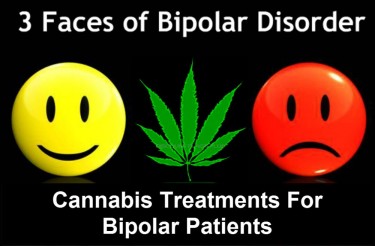
Cannabis has unique benefits for people with bipolar disorder, says new medical research
Around 46 million people around the world struggle with the symptoms of bipolar disorder.
Bipolar disorder can disrupt daily life, affecting relationships and the ability to work. There are three types of bipolar disorder: Bipolar I, whose symptoms include manic episodes that can last at least a week and may even require hospitalization. Bipolar II is characterized by patterns of manic and depressive episodes, particularly elevated moods, which make patients more agitated and energetic. The third type is known as cyclothymic disorder, the symptoms of which include a rapid alternation of high and low mood swings, going from overly energetic and happy to depressed in an alternation.
Psychotherapy and medication are recommended to treat bipolar disorder. Pharmaceutical drugs are traditionally considered necessary to regulate mood. However, many patients do not find any symptom relief from pharmaceutical drugs, especially their effects last for a while and they are usually accompanied by side effects.
Cannabis is a safer, more natural alternative that can help patients with bipolar disorder.
A brand new study, the results of which were presented at the Neuroscience 2022 conference, shows that marijuana may have “unique beneficial effects” for the condition. Researchers presented the results of a study that attempted to understand how cannabis affects cognitive and goal-directed behaviors in people with bipolar disorder. In particular, they found that cannabis was effective in improving cognitive function while helping to reduce risky decisions common in individuals with bipolar disorder.
The researchers also suggest that cannabis reduces dopaminergic activity in the brain to suppress its symptoms.
“Chronic cannabis use can have uniquely beneficial effects in people with BD. Previous studies suggest that some people with BD have increased dopaminergic activity due to reduced dopamine transporter expression,” they concluded. “Chronic cannabis use has been shown to reduce dopamine release, therefore chronic cannabis use in people with BD can result in a return to dopamine homeostasis and consequently normalize their deficits in goal-directed behavior. We are involved in additional studies investigating this potential,” the authors write.
other studies
Similar results were also found in other older studies.
According to data from a 2018 clinical study, researchers found that cannabis use was associated with an improvement in clinical symptoms of bipolar disorder. It also doesn’t negatively impact cognitive performance, they said. Researchers from Harvard Medical School, McLean Hospital and Tufts University analyzed the effects of cannabis on cognitive function and mood in patients diagnosed with bipolar disorder. This was the first clinical study ever conducted with the aim of analyzing how marijuana affects neuropsychological performance and mood.
They found that cannabis use resulted in lower scores for depression, anger, and tension. It was also associated with increased strength. However, patients who used marijuana also showed no significant changes in cognitive performance compared to subjects who did not.
“The current study highlights preliminary evidence that patients with BPD who smoked marijuana regularly reported at least short-term relief of clinical symptoms after marijuana use, indicating potential mood-stabilizing properties of marijuana in at least a subset of patients with BPD,” concluded you .
A significant portion of the population doesn’t even know they have bipolar disorder. However, they suffer from mild symptoms of mood swings and other symptoms of dysregulated moods. Cannabis can help them too.
A 2020 review by researchers at the University of New Mexico, analyzing real-world information from the Releaf app, found that cannabis was effective in treating the symptoms of depression. “One of the more interesting findings of this study is that cannabis flowers with relatively high levels of tetrahydrocannabinol, or THC, are particularly associated with an immediate reduction in the intensity of depressive feelings,” explains researcher Jacob Miguel Vigil. “With no end in sight to the depression epidemic, and given the limitations and potentially serious negative side effects of traditional antidepressants, there is a real need for people to treat mood disorders with natural, safe, and effective medications. The cannabis plant ticks all three boxes,” said Vigil.
Boosting the endocannabinoid system through the use of cannabinoid-based products has been shown to have positive effects on the neuroendocrine system, neurotransmission, and the neuroimmune system. These systems are all heavily influenced by people suffering from depression and other mood disorders such as bipolar disorder.
In a 2006 study from Montreal, researchers found that increasing the amount of endocannabinoids produced by the brain improved mood. McGill University Health Center researchers revealed that the use of the synthetic URB579 agent in animal models resulted in “potent antidepressant effects” as it successfully prevented the breakdown of cannabinoids.
It was the first study to ever prove that something external can help boost cannabinoids and overall mood.
According to lead researcher Gabriella Gobbi, “This is the first time a drug that increases cannabinoids in the brain has been shown to improve your mood,” she said.
Additionally, a 2020 report by BMC Psychiatry found that whole plant cannabis and plant-based cannabinoids improve mood and sleep while reducing anxiety and psychotic disorders.
Conclusion
While research into cannabis for bipolar disorder is fairly new, the studies and anecdotal evidence are promising. If you or a loved one are struggling with bipolar disorder and wish to use cannabis or CBD products, be sure to do so under the guidance of your doctor.
MEDICAL CANNABIS AND BIOPOLAR, READ MORE..

MEDICAL MARIJUANA FOR BIPOLAR PATIENTS TESTING CONTINUE!

Post a comment: